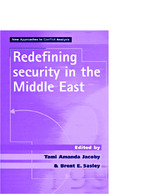Redefining security in the Middle East
Author(s)
Sasley, Brent
Jacoby, Tami Amanda
Language
EnglishAbstract
The end of the Cold War brought about fundamental shifts in the international political system, which many scholars believe have had ripple effects in the field of national security. Literature on security during the Cold War era was primarily focused on the military, the state system, and superpower rivalry. However, with the end of the Cold War, the theory and practice of security has been subject to widespread rethinking, taking into consideration a larger variety of issues that were previously neglected. A major dilemma is that this shifting attitude has been slow to reach the Middle east, one of the most volatile, yet strategic, regions of the Cold-War era. Nowhere is the need to redefine security more pressing than in the Middle east. This book attempts to fill that gap. The contributors to the volume come from a wide variety of backgrounds, but have a common interest in dialogue in support of peace in the Middle east and aim to put forward new concepts, new policies and new discourses about security. There is no singular alternative or magical approach put forward, but a broader terrain is propounded for discussion, debate and analysis of the possibilities and constraints for conflict and conflict resolution in the region. This book will be of vital use to students of the Middle east peace process, as well as students of conflict analysis and peace studies.
Keywords
diplomacy; security; arab; Hamas; Islam; Islamism; Israel; Israelis; Middle East; Palestine Liberation Organization; PalestiniansDOI
10.9760/mupoa/9780719062339Publisher
Manchester University PressPublisher website
https://manchesteruniversitypress.co.uk/Publication date and place
2002Classification
Peace studies and conflict resolution


 Download
Download